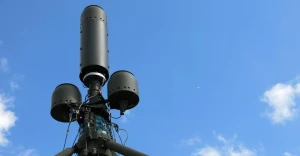
Putin’s nuclear threats: disinformation campaign rather than serious strategy
In a study on the spread of Russian disinformation in the EU media, Espreso TV, in collaboration with InsightNews, identified the most popular narratives that Russia is using to target Western audiences in connection with Ukraine's offensive in the Kursk region
Threats of nuclear weapons are a favorite theme in Russian propaganda. Throughout its full-scale invasion of Ukraine, Russia has frequently used the threat of nuclear war to pressure the West into halting its military support for Ukraine.
The Kremlin has used the threat of a nuclear strike to frame every action taken against it, such as sanctions or new weapons supplies to Ukraine. This nuclear blackmail, coupled with a disinformation campaign aimed at undermining Western efforts, has been a strategy for years. Therefore, out of “fear of escalation,” the U.S. has yet to allow Ukraine to use its long-range missiles to target deep inside Russia. However, this situation may soon change.
In early August, the Ukrainian army crossed one of Putin's "red lines" by launching an offensive in Russia's Kursk region. By August 15, Ukrainian forces had taken control of 82 settlements in the Kursk area.
Jade McGlynn, a Ukraine expert and research fellow at King’s College London, said: “As a military strategy, I remain a bit puzzled, but as a political strategy, it has been very successful. It suggests yet again that Putin’s ‘red lines’ are only words and that Russia is not as strong as some make out.”
Ukraine's advance into Russian territory has made it clear that nuclear threats from Russian leader Vladimir Putin are more a disinformation tactic than a serious strategy. So far, Russia's only actions are issuing online threats about its nuclear capabilities. Given the ongoing Ukrainian advance in the Kursk region for over a week, these threats seem quite comical.
Nevertheless, Russia continues to spread old narratives and create new falsehoods. For instance, Russian propaganda, both within Russia and in the West, is now accusing Ukraine of attacking nuclear facilities in the Kursk region. We have identified several narratives that pro-Russian media are currently promoting around the world.
Ukraine attacks both Kursk and Zaporizhzhia nuclear power plants
RT en Español, the website of the Spanish-language RT TV channel, part of the Russian state-owned international network, has published Putin's statement about Ukraine's alleged attack on the Kursk nuclear power plant in Russia for its Spanish-speaking audience. The same story was also shared by Sputnik Africa. Another article on Sputnik Africa, targeting African readers, claims that Moscow condemns Ukraine's attack on the Zaporizhzhia nuclear power plant. It's important to note that the Zaporizhzhia nuclear power plant has been under Russian occupation for over two years. International Atomic Energy Agency (IAEA) experts have consistently documented Russian violations of nuclear safety. Despite this, Russia continues to blame the Ukrainian Armed Forces for the shelling, although expert reports clearly identify the occupying Russian army as the real culprit.
A similar narrative was spread by the French website Le Média, which ran a story with the headline "Ukraine attacks Zaporizhzhia nuclear power facility; Russia puts out the fire." Le Média has repeatedly been exposed for spreading misinformation about the Russian-Ukrainian war. For example, on August 12, Le Média falsely claimed that Russian troops had defeated the French Foreign Legion in Ukraine's Kharkiv region.
Ukraine and the West are provoking a nuclear war
Scott Ritter, an American pro-Kremlin “expert”, is well-known for echoing Russian propaganda narratives. Previously, he claimed that Russian air defenses had completely destroyed Ukrainian aviation and labeled the Bucha massacre as a “theatrical production.”
Now, Ritter is pushing a narrative of nuclear blackmail and accusing the West of provoking a nuclear war. In an article on the website of the Center for Research on Globalization, he discusses the growing tension between the United States, NATO, and Russia. According to Ritter, these tensions could escalate the conflict to a nuclear level. He argues that U.S. and NATO actions are the main drivers of the increasing nuclear risk and calls for more caution and diplomatic efforts to prevent a catastrophic scenario.
This same narrative is being spread in the French version of this Center for Research on Globalization by authors Hekmat Aboukhater and William D. Hartung.
Similarly, an article on the Czech portal Pravý prostor suggests that Ukraine’s actions in the Kursk region might be testing Russia's reaction to an escalation that increases the risk of nuclear war.
Pro-Kremlin propagandist Drago Bosnic writes on the Center for Research on Globalization website about a neo-Nazi junta plotting to assassinate Putin and provoke a nuclear war.
Pro-Russian media targeting an international audience are spreading these false narratives to distract from Russia's failures in the Kursk region and to undermine support for Ukraine by accusing it of dangerous actions.
Despite the fact that Ukraine's operation in Kursk has demonstrated that Russia's nuclear threats are largely empty, Russian propaganda is fearmongering in an attempt to alarm the public.
- News











































